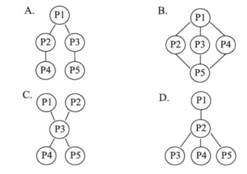题目内容
B
Humans aren't the only ones getting a buzz from coffee. Caffeine can improve memory among honeybees and lead to better pollination(授粉),according to a re?cent study published in the journal Science.
The study was conducted by a team of researchers at Newcastle University in theUnited Kingdom. They found that the nectar(花蜜)of some flowers, such as those from grapefruit and lemon plants, as well as cer?tain coffee flowers, contains low closes of caffeine. To get bees to feed on these flowers, the team trained the insects to associate food with the smell of the flowers. They also trained another group of bees to feed on nec?tar from flowers that were sweetened with a sugar, but did not contain caffeine. After 24 hours, the bees trained on caffeinated flowers returned to these plants three times as often as those trained on the sweetened flowers returned to the uncaffeinated plants.
Professor Geraldine Wright led the researchers. "Remembering floral traits (花部特征)is difficult for bees to perform at a fast pace as they fly from flower to flower and we found that caffeine helps the bee remem?ber where the flowers are?" Wright said in a statement.
Improved memory led to the better pollination. That's because once bees sip the caffeine nectar, they continue to look for more coffee plants to pollinate. This also suggests that caffeine plays a role in improving the bees' ability to search for food.
Researchers found that caffeine's effect on the bee brain is similar to its effect on mammals. "The change is similar to that produced by caffeine in neurons(神经兀) associated with learning and memory in the rat brain," Wright said.
Bee populations have declining since 2007. The dra?matic drop in the insects' numbers has serious effects on ecosystem and the farming industry. Bees are needed in the reproduction of crops and spreading wild flower spe?cies. Understanding what keeps bees buzzing could help to make sure that the insects are able to remember and pollinate their favourite flowers.
5. Which of the following is mentioned in the passage?
A. Caffeine has no effect on the rat brain.
B. Bee population has been increasing.
C. The nectar of lemon plants contains caffeine.
D. Bees dislike nectar from sweetened flowers.
6. After reading the passage, John, who works in the farming industry, will probably feel .
A. annoyed B. angry
C. nervous D. excited
7. We can know from the passage that .
A. the rat is a mammal
B. caffeine has nothing to do with memory
C. bees are good at remembering floral traits
D. Geraldine Wright did the research on his own
8. What section of a newspaper may this passage be taken from?
A. Science. B. Education.
C. Culture. D. Sports.
【文章大意】文章介绍了从咖啡中受益的不仅仅是人类,有的花蜜中含有咖啡因,吃了带有咖啡因的花蜜的蜜蜂能提髙记忆力, 从而更多地授粉,因此农产品的产量得以提髙。
C 细节理解题。根据第二段中的"They found that the nec-tar(花蜜)of some flowers, such as those from grapefruit and lemon plants, as well as certain coffee flowers, contains low doses of caffeine."可知柠檬的花蜜里含有咖啡因。
D 推理判断题。从文章最后一段中的"The dramatic drop in the insects' numbers has serious effects on ecosystem and the farming industry. Bees are needed in the reproduction of crops and spreading wild flower species."可以看出蜜蜂数量的下降巳经对生态和种植业产生了严重的影响,吃了带咖啡因花粉的蜜蜂会更多地授粉,从而提高农产品的产量。故作为从事种植业的John读了这篇文章会感到兴奋。
A推理判断题。从文章倒数第二段可以推断老鼠也是一种哺乳动物。
A 文章出处题。从第一段的句子"…according to a recent study published in the journal Science.',可看出这篇文章出自报纸的科技版面。

